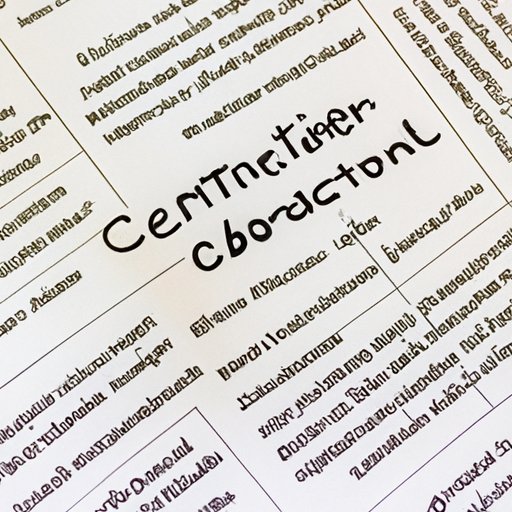
I. Introduction
Being a teacher is a rewarding career in many ways. However, there is often confusion about what education is required to become a teacher. Not all teaching jobs require the same level of education, and the requirements can differ depending on the state or district you plan to teach in. This article will delve deep into the types of education a potential teacher may need as they pursue what is a fulfilling and highly respected career.
II. The Roadmap to Becoming a Teacher: A Step-by-Step Guide to the Education You Need
The path to becoming a teacher begins with securing a bachelor’s degree, as this is generally one of the primary requirements for teacher certification.
After securing a degree, a teaching candidate will need to get a teaching certification, which usually means additional education and licensing tests. It’s important to check with the state or district where you plan to teach to see which licenses, tests, or certifications are required as each state will have different requirements.
III. Breaking Down the Required Education for Future Teachers: From Bachelor’s Degrees to State Licensure
Getting a bachelor’s degree is typically the first step in the journey to becoming a teacher, and it is recommended that students take coursework that aligns with subjects like education, child development, and psychology. These courses will help give you a solid background for your teaching career as well as a better idea about what to expect as an educator.
A master’s degree is not usually required to become a teacher, but it can open up more opportunities for employment and career growth. Teachers who have master’s degrees might be considered for higher-paying positions, special education or administrative jobs.
In addition to a college degree, all states require teachers to have a license or certification, which may include additional coursework and testing. Some states like California and Texas require their future teachers to attend a state-certified program, which provides training on running a classroom, developing lesson plans, and working with various age groups effectively.
IV. The Essential Education for Aspiring Teachers: Which Degrees and Certifications Are Necessary for Success?
Teachers will usually need to pass a licensure test like the Praxis®, which is an exam that certifies that a teacher has the necessary knowledge and skills to be considered proficient in their field. Each state will have their own variations of the exam, so it’s important to know which states your desired career path will lead you to and what exam you can expect to be tested on.
Most states have alternative certification programs for people who hold a bachelor’s degree but have not gone through a traditional teacher education program. For example, Teach for America has a program that helps students obtain their teaching certification after college. While alternating certification programs can vary in requirements, they usually are offered through state department of education and requires additional coursework, testing, and classroom experience.
V. Finding Your Path to the Classroom: The Role of Education in Preparing for a Career in Teaching
When it comes to pursuing a career in teaching, there are different paths to choose from, including traditional undergraduate, alternative post-baccalaureate certification programs, and overseas teaching programs.
Teach for America is an excellent alternative certification program that prepares high-achieving college graduates to enter classrooms fast. Their program is designed to not only provide their members with the credentials they need but also to give them the practical experience they need to be successful in the classroom.
Education majors benefit from specialized programs that connect them to different school districts and help them gain practical classroom experience. They also have the added benefit of enrolling in coursework that’s specifically designed to prepare them to enter the world of teaching.
VI. The Education Puzzle: How Different Levels of Education Prepare You for a Future in Teaching
Each level of education, from undergraduate to master’s degree, offers different benefits in terms of preparing students to be successful teachers.
Undergraduates gain foundational knowledge and a strong understanding of subject areas, including pedagogy and classroom management.
Graduate students gain a more comprehensive understanding of subjects like educational psychology and leadership, as well as access to research and publications that can enhance their classroom performance.
Alternative certification programs make it possible for people with non-education degrees to transition into teaching fields and to develop practical skills needed to succeed in the classroom.
VII. Conclusion
Becoming a teacher is a noble and vital career, but it requires a certain level of education to succeed. Different paths will lead to different results, but if you know what steps to take and how to proceed, then you shouldn’t have a problem finding success. It’s important to research your state’s requirements, the credentials you need, and to carefully consider the type of program that fits your lifestyle and goals.





